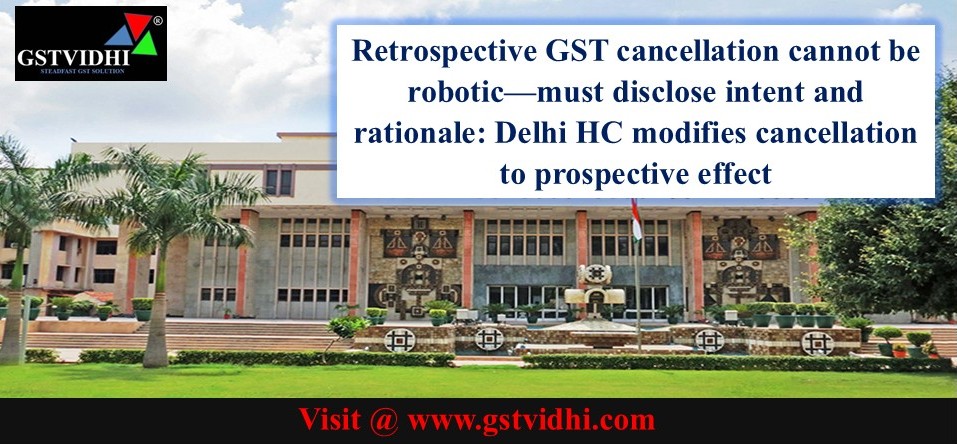
Retrospective GST cancellation cannot be robotic—must disclose
intent and rationale: Delhi HC modifies cancellation to prospective effect
Summary of
the Case
The Delhi High Court
allowed the writ petition filed by M/s Empower Inc., which challenged
the retrospective cancellation of its GST registration, effective
from 02 July 2022, through an order dated 15 July 2024.
The Show Cause Notice
(SCN) issued earlier on 11 June 2024 did not mention any intention to
cancel the registration with retrospective effect, nor did the final
order give any reasons justifying retroactivity. The Court held this
approach to be contrary to settled legal principles and modified the order to
treat the cancellation effective only from 11 June 2024 (the date of the
SCN).
Case Title: M/s Empower
Inc. v. Principal Commissioner of Goods and Services Tax, West Delhi
Case Number: W.P.(C)
2850/2025
Date of Judgment: 06
March 2025
Court and Bench: High
Court of Delhi at New Delhi
Facts of
the Case
- GST Registration
of the petitioner was cancelled by the respondent through an order dated 15
July 2024, with retrospective effect from 02 July 2022.
- The cancellation proceedings were
initiated based on a Show Cause Notice (SCN) dated 11 June 2024.
- The SCN did not disclose any
proposal or rationale for making the cancellation retrospective.
- The petitioner challenged the retrospective
cancellation, arguing that it was arbitrary, unreasoned, and
contrary to law.
Legal
Provisions Involved
- Section 29(2) of the CGST Act, 2017:
Grants power to cancel registration with retrospective effect, provided
the circumstances warrant such action.
- Principles of Natural Justice:
Require that a taxpayer be clearly informed of any adverse intent (like
retrospective effect) and be given an opportunity to respond.
Petitioner’s
Submissions
The petitioner, through
counsel, submitted:
- The SCN dated 11 June 2024
contained no mention or hint of any intention to apply the
cancellation retrospectively from 02 July 2022.
- The final order dated 15 July 2024
did not provide any reasoning or justification for backdating the
cancellation.
- The action caused severe financial
and legal prejudice, especially as the petitioner continued to conduct
business during the period in question and filed returns accordingly.
- The petitioner relied on Delhi
High Court judgments such as:
- Riddhi Siddhi Enterprises v.
Commissioner of CGST, South Delhi
- Ramesh Chander v. Assistant
Commissioner, CGST, Dwarka Division
- Delhi Polymers v. Commissioner of
Trade and Taxes
In all these cases,
retrospective cancellation orders were quashed where the SCNs and final orders
lacked clarity or reasons.
Court’s
Analysis and Findings
The Court engaged in a
detailed discussion of legal principles governing retrospective cancellation,
with reference to Section 29(2) of the CGST Act and relevant case law.
A. Power Must Be
Exercised Judiciously
Citing Riddhi Siddhi
Enterprises, the Court held:
“While the provision does
enable the respondents to cancel registration with retrospective effect, the mere
existence of such a power does not justify its invocation.”
The judgment emphasized
that retrospective cancellation has grave consequences, including:
- Impact on Input Tax Credit
(ITC) claimed by buyers;
- Exposure of the taxpayer to interest
and penalties;
- Potential criminal prosecution
for raising invoices while being unregistered.
B. SCN Must Clearly
Disclose Retrospective Intent
“Absence of reasons in
the original SCN in support of a proposed retrospective cancellation… clearly
invalidates the impugned action.”
The Court reiterated that
taxpayers must be placed on advance notice if retrospective cancellation
is being considered. Without this, they are denied an opportunity to explain
their conduct during the period sought to be retrospectively invalidated.
C. Final Order Must Be
Reasoned
In line with Delhi
Polymers and Ramesh Chander, the Court observed:
“The registration cannot
be cancelled with retrospective effect mechanically… Such satisfaction must be
based on some objective criteria.”
The order dated 15
July 2024, however, lacked any such explanation.
Court’s
Final Directions
The Delhi High Court held
that the impugned order of cancellation suffered from legal infirmity,
and passed the following directions:
1. Writ
Petition Allowed.
2. Order
of Cancellation Modified:
o The
GST registration of the petitioner shall be treated as cancelled with effect
from 11 June 2024 (i.e., the date of the SCN).
o The
retrospective stipulation of 02 July 2022 is quashed.
3. Liberty
Reserved:
o The
GST authorities are not precluded from issuing fresh SCN or taking
appropriate action under the law if justified and supported with reasons.
Conclusion
This decision reaffirms
that retrospective cancellation of GST registration is a serious action
with far-reaching legal and commercial implications. Authorities must exercise
this power judiciously and transparently.
By modifying the
cancellation date and holding the department accountable to reasoned
decision-making, the Court has once again emphasized the foundational
importance of procedural fairness and natural justice in GST administration..
Disclaimer: All the Information is based on the notification, circular and order issued by the Govt. authority and judgement delivered by the court or the authority information is strictly for educational purposes and on the basis of our best understanding of laws & not binding on anyone.
Find the Attachment (Press on Click Here )
Click here